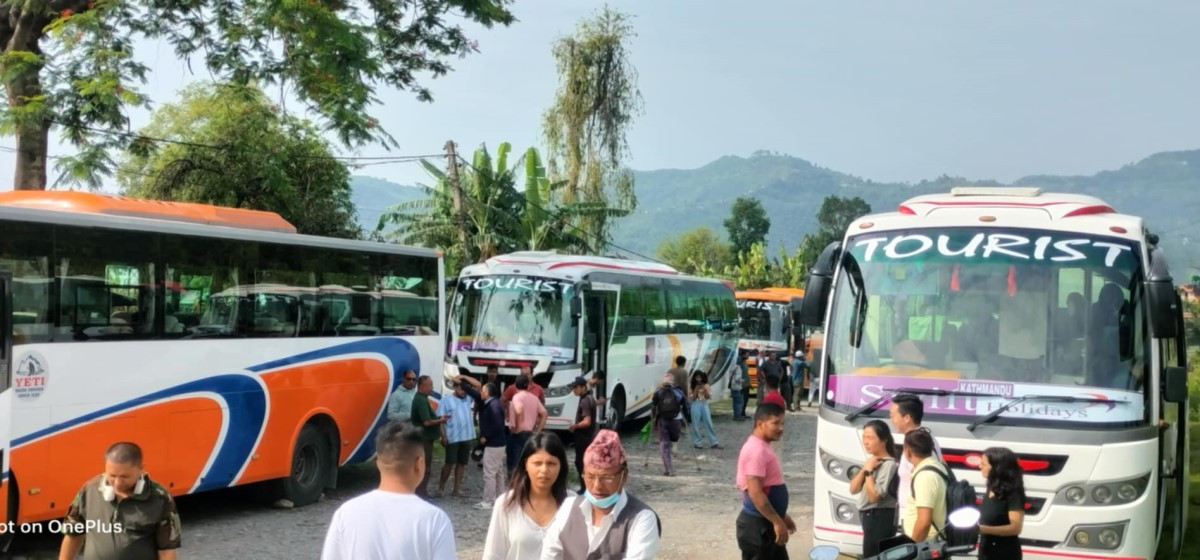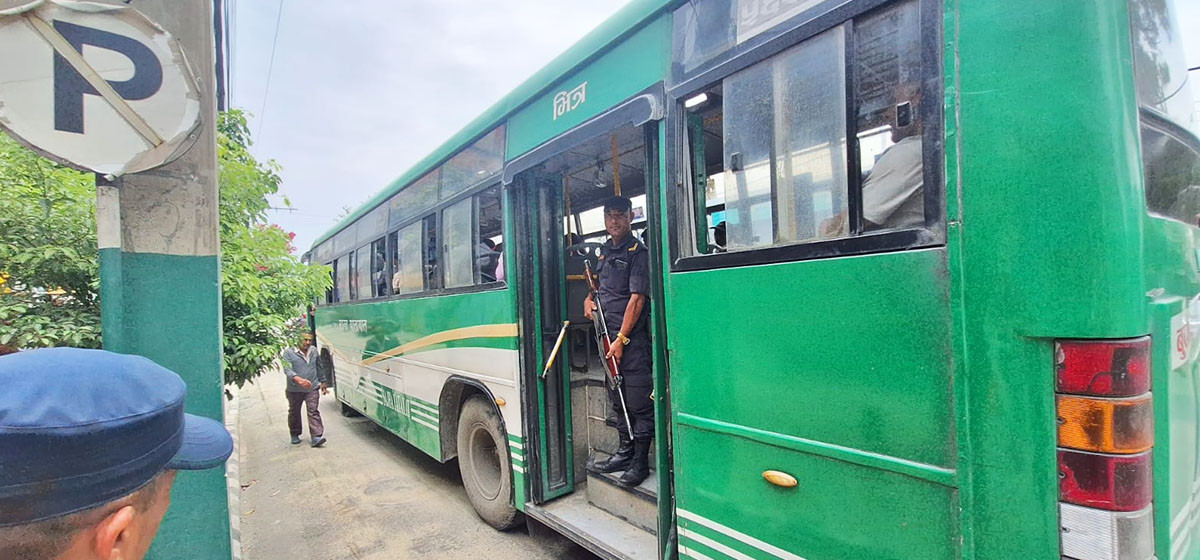POKHARA, June 1: Public transportation in Gandaki Province has been completely halted for three days, causing hardship for passengers. Transport operators have launched a strike in protest against the “Gandaki Province Ride Sharing (Regulation and Management) Rules 2082.” The strike is affecting ordinary citizens, including students and those with urgent travel needs.
In Pokhara, students who came to take exams and others with essential reasons, have faced difficulties traveling. After exams ended on Saturday, many students were stranded in Pokhara as they could not find transport to their destinations. Those who had to travel were forced to pay high fares. Many students remained stuck in Pokhara until Sunday.
Transport entrepreneurs have warned that if the provincial government does not repeal the newly introduced regulations, public transportation across the country will be brought to halt from Monday. As the entrepreneurs’ protest intensifies, even internal passengers are being prevented from traveling in tourist vehicles.
In response to the entrepreneurs’ opposition, the provincial government has formed a negotiation committee led by Kamal Kumar Adhikari, secretary of the Ministry of Physical Infrastructure Development and Transport, to hold talks with the entrepreneurs. However, no negotiations have taken place so far.
The entrepreneurs have warned that if the provincial government does not revoke the regulations, they will launch a nationwide movement. Kedar Prasad Paudel, president of the Federation of Nepalese National Transport Entrepreneurs (FNNTE), Gandaki, stated that the protest was necessary due to the government’s lack of cooperation.
He said the government has treated them differently, accusing them of opposing ride-sharing services. “The provincial government should understand whether it is appropriate to introduce this regulation or not. We are only being labeled as opponents of ride-sharing. What we have asked for is proper management,” he said, “All companies should be allowed to operate smoothly. If people are going to continue transporting passengers, there should be uniformity in the license plates.”
‘Coffee 2 Go Nepal’ brings mobile coffee stall in Kathmandu

He accused the Gandaki government of violating the Transport Regulations of 2049 BS. “There should be uniform treatment for everyone engaged in the profession,” he said, “The general public should also be aware of this issue. It is not fair to always blame the entrepreneurs alone and let the matter be dismissed. Everyone should understand that.” President Paudel also claimed that, when examinees and pilgrims faced difficulties due to the protest, they coordinated with security agencies to help send them to their destinations.
The Gandaki Province Government has made it clear that the regulation formulated to manage and regulate ride-sharing services will not be repealed under any circumstances. Kamal Kumar Adhikari, secretary of the Ministry of Physical Infrastructure Development and Transport of Gandaki Province and coordinator of the negotiation committee formed to hold talks with protesting transport entrepreneurs, stated this clearly at a press conference on Sunday.
At a press conference held to provide information on the issue, Secretary Adhikari stated that the ride-sharing regulation will not be repealed but can be amended. He explained that the regulation was introduced based on public demand, current needs, and court orders. Adhikari said, “The regulation can be amended, but it will not be repealed.”
Although the entrepreneurs’ team did not come for formal talks, they had met earlier and submitted a seven-point demand to the negotiation committee. In response, the committee formed a five-member negotiation team and invited the entrepreneurs to join the talks. However, no formal negotiations have taken place yet.
Despite repeated requests, the entrepreneurs have not attended the talks. Therefore, on Sunday, the negotiation committee held a press conference urging the entrepreneurs to return to the negotiation table.
Stressing that a solution can only be found through dialogue and discussion, committee coordinator Secretary Adhikari said, “Let’s discuss the unresolved issues. If an agreement is reached, the regulation can be amended.”
Prem Subedi, member of the negotiation committee and head of the Department of Transport Management, warned that if the entrepreneurs do not come to the talks, the government will take further action. “We want the problem to be solved through dialogue,” he said. “But if they stubbornly refuse to attend the talks, the government will take the next step.”
He claimed that since the court has twice ordered the government to enact laws related to ride-sharing and once regarding self-ride services, the government introduced and implemented the regulation accordingly to comply with these orders.
Subedi argued that the ride-sharing regulation issued by the province does not conflict with the Motor Vehicles and Transport Management Act, 2049 (1993) and its regulations of 2054 BS. Also serving as the ministry’s spokesperson, Subedi stated that since federalism has been implemented and the authority over transport management has been given to the provinces, the province has the right to enact necessary laws and regulations.
“We had asked the federal government to amend the law,” he said, “but since it was not amended for a year, the province can make its own law. Even if such a law conflicts with federal law, it will not be repealed.” He also claimed that the recognition of ride-sharing has made the general public happy.
Tourist buses departing from the Tourist Bus Park at Rastriya Banijya Bank Chowk in Pokhara have been obstructed by protesting transport entrepreneurs. Due to the entrepreneurs’ blockade, tourist buses heading to various destinations from Pokhara were stopped. On Saturday, tourist buses were blocked at Talchowk, and on Sunday, they were stopped at Prithvi Chowk. The entrepreneurs obstructed the tourist buses, claiming that internal passengers were being allowed to board these tourist vehicles.
During the protest, tourism entrepreneurs allowed all buses to depart from Pokhara to their destinations between 7:30 and 8:00 am. However, when the buses that left earlier were blocked at Prithvi Chowk on Sunday morning, they were sent back to the bus park. After about two and a half hours (around 10:30 am), under the escort of security personnel, the tourist buses were allowed to resume their journeys.
According to Hari Ram Adhikari, outgoing president of the Nepal Association of Tour and Travel Agents (NATTA) Gandaki, despite the blockades, 24 tourist buses departed for their destinations on Sunday. A similar number of buses had left on Saturday as well. He added that tourist buses only operate from Pokhara to Kathmandu, Chitwan, and Lumbini.
He said that the service is provided to facilitate travel for both domestic and foreign tourists. “Their obstruction is because we allowed domestic passengers to board. If domestic tourists are not allowed to travel, the entire tourism sector will come to a halt. It is not acceptable to allow only foreign tourists to travel,” he said. Kishor Dahal, president of NATTA, said that tourist buses were obstructed on the grounds that they allowed domestic tourists to board.




































